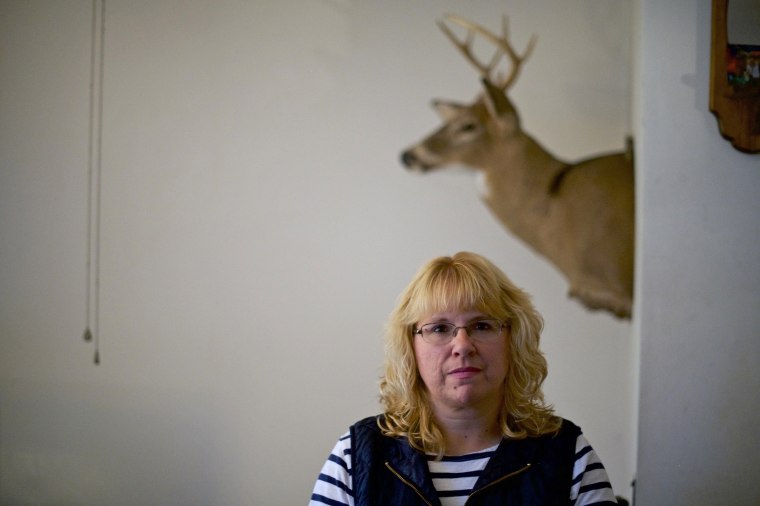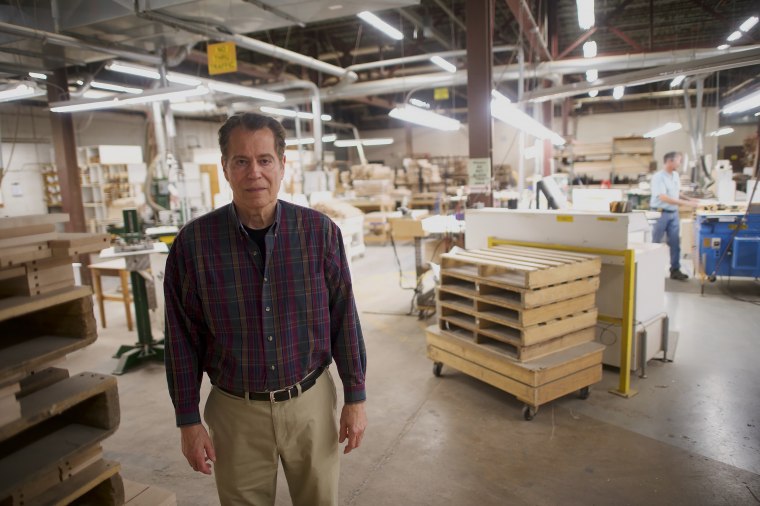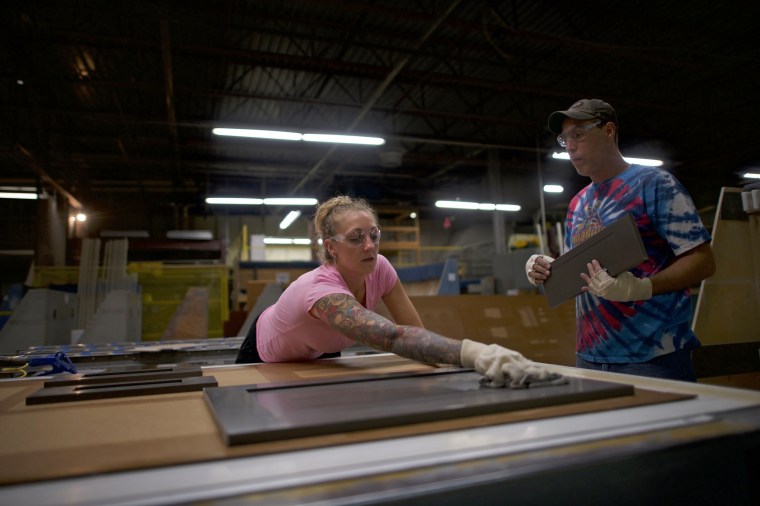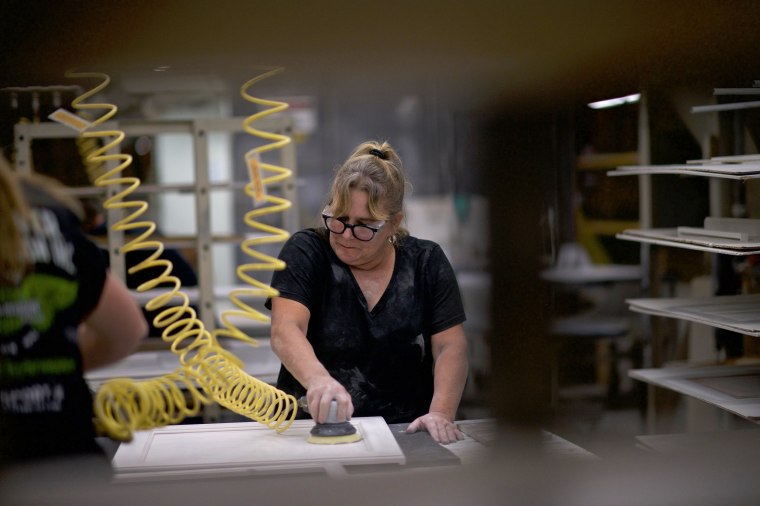A manufacturing recession may already be under way in vulnerable swing states, challenging President Donald Trump’s campaign promise to deliver blue-collar jobs to his base.
Out of the 22 states with manufacturing job losses so far this year, some of those with the biggest percentage declines are states where Trump won by less than 5 percentage points, according to an NBC News analysis of the latest employment data, released last week. In Pennsylvania, the manufacturing sector lost 8,100 jobs. In North Carolina, it was 7,700, and Wisconsin lost 6,500 jobs.
The closure of Wood-Mode, a 77-year-old family-owned factory in the farmland of rural Kreamer, Pennsylvania, was responsible for over 900 of the manufacturing jobs lost in that state this year, one of the most by a single company.
Wood-Mode was known for making the “Cadillac” of custom cabinets. Full kitchen sets could sell for over $100,000. Even dealers who were burned by the shutdown spoke glowingly of the unparalleled craftsmanship and finish.
But there had been signs over the years that Wood-Mode was having difficulty, including cost-cutting moves, layoffs and difficulty paying bills and obtaining materials.
Cabinet lines can be had at hardware chains for a few thousand dollars. Cheap Chinese imports nipped at the bottom of the industry’s pricing ladder. And though the machinery was kept in good condition, some equipment was older, and took more steps or time than newer equipment. Facing these and other headwinds, in 2017 Wood-Mode restructured its debt and accessed millions of dollars in new liquidity.
It wasn’t enough, but no one expected what came next.
Employees who had worked there for decades were given minutes to leave. Partially completed cabinets were left on the floor of the 1.3 million-square-foot facility.

"They came out and told us shut everything off. Turn off the radio. ... 'As of right now, you’re all laid off indefinitely,'" said Michele Sanders, 41, who had worked at the company for two decades immediately after graduating from high school, no college degree required.
“We had about 10 minutes to get our stuff and get out,” said Sanders, a mother of two. Employees drifted out into the parking lot in a daze, under the eye of local law enforcement. “I was in my car with tears flowing out of my eyes. We were all in shock,” she said.
Two days before the struggling factory was to be sold, the buyer had backed out, according to a statement from the plant’s human resources director.
“There had been a slow decline in the profitability of the company, and it finally got to the point where the lender said 'no' and pulled financing,” said Bill French, a businessman who purchased the company's assets in July.
The former owner, Robert Gronlund, and his son and vice president of operations, Brooks Gronlund, didn’t respond to NBC News emails and calls seeking comment. Neither did the primary lender, Great Rock Capital of Connecticut.
The lack of explanation or warning by the Gronlunds came as a shock to all.
“I had full kitchens being delivered Thursday. They shut down Monday,” said Evan Levey, founder of Columbia Cabinets, a New York-based dealer of Wood-Mode cabinets. “They left a lot of people out in the dust.”
Some of Wood-Mode’s almost 600 nationwide dealers exclusively dealt in Wood-Mode and had to scramble to complete orders with other vendors.
Anxious customers took to asking questions in a Facebook group.
“I have been without a kitchen for 2 months and would love to stay with Wood-Mode but without answers, I am exploring other cupboard companies. Help?” one customer posted.

The day after the company shut down, French, a local businessman who runs a custom modular home manufacturing business, showed up with his business card asking how he could save jobs.
“I wanted to do it as a business opportunity and something the community needed,” French said.
Some of the former employees were able to move on to new jobs, some at other cabinet companies, in machine service, health care or other occupations. Others are still waiting for their call back. For some, times were especially tight. A surge of over 100 ex-employees reportedly showed up at a food bank for free donated food in the week after the layoffs.
“There’s a lot of skilled people. Skilled in the cabinet industry,” French said. “Their skills are limited in usefulness for other things. They’re fantastic craftsmen.”
Three months later, French reopened the factory and has slowly hired back almost 250 employees, about one-quarter of the old workforce, at about a 10 percent reduction in salaries, and raised some prices. He thinks the factory can be profitable at this level and hopes to grow from there and regain the confidence of dealers.
“The cabinet business is a competitive business,” French said. “It’s a complicated business, one that’s difficult to run. If you don’t do everything right, you probably won't last for long.”
Long-time employees given a second chance at the streamlined company are happy to be back.
“Wood-Mode was a family. When you work with people most of your life, we became like brothers and sisters,” said Paul Kehler, a 35-year veteran of the company, rehired to work in final inspection. “That’s why I came back.”
The employees now work four days a week, 10 hours a day, and are asked to do multiple jobs instead of focusing on one.
“I told my foreman, whatever it takes to get this up and running, I’m willing to do,” said Kehler, 58. “I want to see it take off and grow again.”

After two consecutive quarters of contraction, the majority of economists in a recent Wall Street Journal survey believe the manufacturing sector is in recession.
Amid a global economic slowdown, businesses whipsawed by a protracted and chaotic trade war and haphazard policymaking have grown increasingly uncertain about the future.
“What that uncertainty does is make businesses hesitant to build inventory, how many goods to sell over the next year. It affects their decisions about hiring and makes them more cautious,” said Brian Phelan, an associate professor of economics at DePaul University.
Pennsylvania’s workforce is more exposed to some of the growing economic anxieties because the state’s industry mix is weighted toward businesses reliant on capital and investors, like manufacturing and mining.
“Companies that depend on investment or are debt-oriented suffer a lot during a downturn,” said Julia Pollak, a labor economist with the online employment marketplace ZipRecruiter.
“Investors become cautious when there’s uncertainty and talk of a recession,” she added. “Their tolerance for risk becomes less.”
The number of job postings for the largest manufacturing occupations have fallen nationwide over the past year, according to the site’s data. Want ads for production managers are down 72 percent; machine operators, 64 percent; and assembly line workers, 32 percent.
The manufacturing declines come in spite of, or in some ways, accelerated by, Trump’s protectionist measures and bruising trade war.
“Economic logic is a strong thing. Like gravity, you can’t escape the inevitable forces for long,” Pollak said.
The question is whether the manufacturing recession cuts into Trump’s election prospects.
"I don’t think [Trump] had anything to do with it, but I don’t know that he’s helping matters."
Sanders and others in the heavily Republican area voted for the president, but she doesn’t think he’s had an impact either way on the larger economic forces and smaller business decisions that led to the factory’s swift shuttering.
But management decisions that might have slid by in more flush times can now push a business over the edge.
“Wood-Mode was having troubles before Trump took office,” said Sanders, who recently found work as a U.S. Postal Service rural mail associate, substituting for other carriers. On Sundays she delivers for Amazon.
“I don’t think he had anything to do with it," she said of Trump, "but I don’t know that he’s helping matters."

